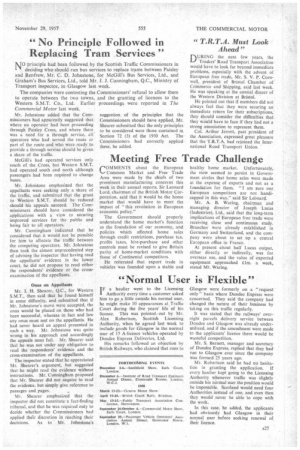"No Principle Followed in Replacing Tram Services"
Page 29

If you've noticed an error in this article please click here to report it so we can fix it.
MO principle had been followed by the Scottish Traffic Commissioners in " deciding who should run bus services to replace trams between Paisley and Renfrew, Mr. C. D. Johnstone, for McGill's Bus Services, Ltd., and Graham's Bus Services, Ltd., told Mr. J. J. Cunningham, Q.C., Ministry of Transport inspector, in Glasgow last week.
The companies were contesting the to operate between the two towns, Western S.M.T. Co., Ltd. Earlier Commercial Motor last week.
Mr. Johnstone added that the Commissioners had apparently suggested that where no operator had been proceeding through Paisley Cross, and where there was a need for a through service, all operators who had served the route or part of the route and who were ready to provide a through service should be given a share of the traffic.
McGill's had operated services only south of the Cross, but Western S.M.T, had operated south and north although passengers had been required to change buses.
Mr. Johnstone emphasized that the appellants were seeking only a share of the traffic, and submitted that the grant to Western S.M.T. should be reduced should his appeals succeed. The Commissioners should have considered the applications with a view to securing improved services for the public and being fair to all operators.
Mr. Cunningham indicated that he considered that it would not be possible for him to allocate the traffic between the competing operators. Mr. Johnstone then took the almost unprecedented step of advising the inspector that having read the appellants' evidence in the lower court, he did not propose to read either the respondents' evidence or the crossexamination of the appellants.
Onus on Appellants Mr. I. H. Shearer, Q.C., for Western S.M.T., then said that he found himself in some difficulty, and submitted that if Mr. Johnstone's move were accepted, the onus would be placed on those who had been successful, whereas in fact and law any onus must rest on the appellants. He had never heard an appeal presented in such a way. Mr. Johnstone was quite wrong in his approach and accordingly the appeals must fail. Mr. Shearer said that he was not under any obligation to read the respondents' evidence and the cross-examination of the appellants.
The inspector stated that he appreciated Mr. Shearer's argument, but suggested that he might read the evidence without instructions. Mr. Cunningham proposed that Mr. Shearer did not require to read the evidence, but simply give reference to passages and pages.
Mr. Shearer emphasized that the inspector did not constitute a fact-finding tribunal, and that he was required only to decide whether the Commissioners had applied their discretion in reaching their decisions. As to Mr. Johnstone's
Commissioners' refusal to allow them and the granting of licences to the proceedings were reported in The
suggestion of the principles that the Commissioners should have applied, Mr. Shearer submitted that the only principles to be considered were those contained in Section 72 (3) of the 1930 Act. The Commissioners had correctly applied these, he added.




























































































